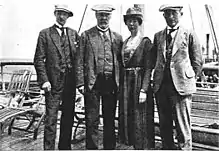
Ebba Hult de Geer (2 June 1882-28 July 1969) was a Swedish geologist known for her development of the geochronology of Sweden. [1]
Biography
Ebba Hult was born at Rödeby parish in Blekinge, Sweden. Hult was a teacher at Risbergska in Örebro 1902–04 and at Whitlockska in Stockholm 1904–07. She studied at Stockholm University 1906–08. She was a research assistant and secretary working with her husband, Gerard de Geer (1858-1943) who she married in 1908. [2][3]
De Geer was a professor of geology at Stockholm University and an influential participant in international geology. In 1924 De Geer retired from teaching and became the founder-director of the Geochronological Institute at Stockholm University. Following her husband's death in 1943, Hult became leader of Stockholm University Geochronological Institute.[4]
Hult managed to create her own role as researcher in geochronology. She used varved clay in glacial lakes as evidence for ancient climates (paleoclimatology) and studied similar deposits worldwide to establish a global climate history. [5][4]
References
- ↑ "De Geer, Ebba Hult". Vem är Vem? Stor-Stockholm 1962. Retrieved September 1, 2020.
- ↑ "Baron Gerard de Geer, For. Mem.R.S". Nature volume 152, pages209–210 (1943). Retrieved September 1, 2020.
- ↑ "A Fractured Position in a Stable Partnership: Ebba Hult, Gerard De Geer, and Early Twentieth Century Swedish Geology". Cambridge University Core, Volume 27, Issue 3. September 2014, pp. 423-451. Retrieved September 1, 2020.
- 1 2 Bergwik, Staffan (2014-09-01). "A Fractured Position in a Stable Partnership: Ebba Hult, Gerard De Geer, and Early Twentieth Century Swedish Geology". Science in Context. 27 (3): 423–451. doi:10.1017/S0269889714000131. ISSN 1474-0664. S2CID 143483779.
- ↑ Hulbe, Christina L.; Wang, Weili; Ommanney, Simon (2010-12-01). "Women in glaciology, a historical perspective". Journal of Glaciology. 56 (200): 944–964. Bibcode:2010JGlac..56..944H. doi:10.3189/002214311796406202.